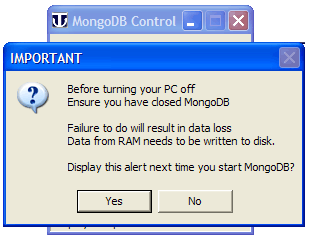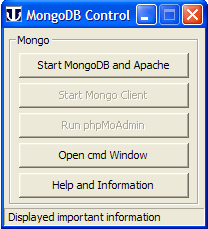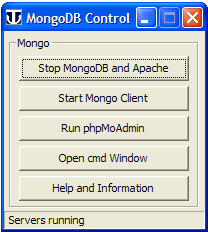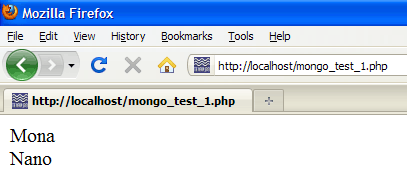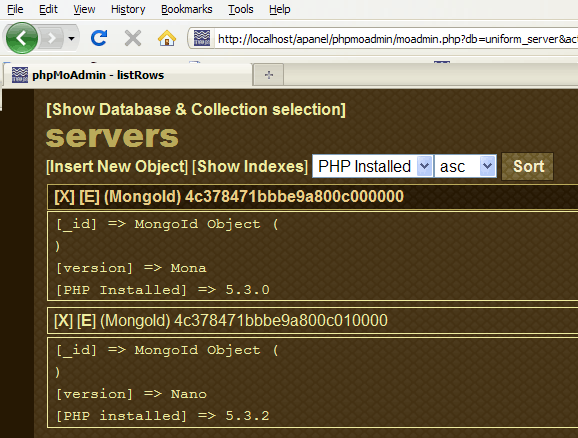MongoDB: Plugin: Difference between revisions
(New page: {{Nav MongoDB}} '''''MongoDB''''' == Introduction == Uniform Server MongoDB plugin installs MongoDB server, phpMoAdmin browser administration interface and PHP driver on Uniform Server 6-C...) |
(No difference)
|
Revision as of 19:34, 1 August 2010
|
MongoDB : Introduction | Standalone | Plugin | Production Standalone | Production Plugin
|
|
| UniServer 6-Carbo MongoDB Uniform Server Series. |
MongoDB
Introduction
Uniform Server MongoDB plugin installs MongoDB server, phpMoAdmin browser administration interface and PHP driver on Uniform Server 6-Carbo.
A Windows interface is provided allowing you to start and stop both Apache and MongoDB servers. From this interface you can start either the mongo-client or phpMoAdmin these allow you to administer mongo-databases. A single button click opens a command window giving you access to Mongo’s suite of command-line tools.
It’s the Windows interface (implemented using WinBinder) that makes this plugin specific to Uniform Server 6-Carbo. However that said its core component will run alongside any version of Uniform Server or other server see | MongoDB twist for details.
Download and Install
Options 1
- Download file mongo_plugin_v1_0.exe from Sourceforge. For download details see MongoDB Introduction (Main Start page)
- Save it to folder UniServer.
- To extract files, double click on file mongo_plugin_v1_0.exe, no need to change the path.
- A new file Start_MongoDB.exe is added to folder UniServer.
Options 2
- Download file mongo_plugin_v1_0.zip from Sourceforge. For download details see MongoDB Introduction (Main Start page)
- Save to any folder e.g temp
- Extract files, navigate to folder temp\mongo_plugin_v1_0
- Copy contents of this folder to folder UniServer
Run
|
Start Windows interface Double click on file Start_MongoDB.exe located in folder UniServer.
The nag pop-up can be infuriating hence click no not to display it again at next start up. Note: If you want to restore the nag pop-up delete the following file: UniServer\usr\local\mongo\us_info\no_nag.txt |
|
|
Start Servers Start server click Start MongoDB and Apache button. Note: With the servers running greyed out buttons are enabled. Stop Server Button toggles displaying Stop MongoDB and Apache Open cmd Window Opens a command window and changes to folder:UniServer\usr\local\mongo\bin Provides access to Mongo’s suite of command-line tools. |
|
|
Button Start Mongo Client Opens a command window and runs mongo-client. Button is enabled when servers are running otherwise is disabled. Button Run phpMoAdmin Opens phpMoAdmin in default browser. Button is enabled when servers are running otherwise is disabled. Button Help and Information Opens main read me file in Notepad. |
Note 1: When challenged by your firewall always grant Internet access
Note 2: Plugin is self-contained no need to run UniTray.
Note 3: This plugin runs as a standard program and not as a service. It is for development only do not use for a production server.
Test
This plugin includes a test script allowing you to explore.
I assume you have started Windows interface and servers:
- Start MongoDB - Double click on Start_MongoDB.exe
- Run Servers - Click "Start MongoDB and Apache" button
|
Run test script Type into a browser http://localhost/mongo_test_1.php Nothing spectacular, it creates a database and display entries as shown on the right. |
|
|
Run phpMoAdmin Click "Run phpMoAdmin" button Test script creates a database with two entries this allows you to explore phpMoAdmin features. Generally have a play run mongo-client and explore its capabilities. Refresh phpMoAdmin to view changes. |
Clean up
When you have finished playing you probably will want to clean up and start afresh.
- Close MongoDB – Click "Stop MongoDB and Apache" button
- Navigate to folder: UniServer\usr\local\mongo\data\mongodb
- Delete its contents. Removing all databasss created effectively gives you a clean install.
New User
If you are a new user to Uniform Server welcome, your website files are placed in folder UniServer\www.
To clean this folder prior to adding your material with the exception of file .htaccess you can delete everything.
Plugins may add to this folder for testing. MongoDB plugin adds a single file mongo_test_1.php hence deletr it after testing.
MongoDB twist
MongoDB is a server in its own right and can be run independently of Uniform Server.
If you have ever looked at other Uniform Server plugins you will find what appears to be redundant code. This plugin is no exception it contains minimal amount of code to run MongoDB server independently.
Extract MongoDB core
Buried within the plugin is a MongoDB core once extracted it can be run indecently.
Extract as follows:
- Create two new folders for example mongo_temp and mongo_temp2
- Download plugin either mongo_plugin_v1_0.exe or mongo_plugin_v1_0.zip
- Save to mongo_temp and extract by double clicking on mongo_plugin_v1_0.exe
- Navigate to folder mongo_temp\usr\local\mongo
- Copy this folder and all its content to folder mongo_temp2
- You can delete folder mongo_temp its no longer required.
- Delete folder mongo_temp2\mongo\us_info not required
Note:
You can copy folder mongo_temp2\mongo and all its contents to any location and run from there.
Alternative control
That redundant code I mentioned above is contained in folder alt_control_2
It contains batch files to start and stop MongoDB server.
They use uniserv.exe to run MongoDB hidden in the background.
For convenience two batch files are provided one opens a command prompt allowing you to access Mongo’s command line tools the other directly runs the Mongo client tool.
Files:
Start_mongo.bat - Run MongoDB server hidden
Stop_mongo.bat - Cleanly stop MongoDB server
monogo_client.bat - Directly runs mongo-client
run_cmd.bat - Opens a command window changes to bin folder allowing
you to run MongoDB's command line tools
uniserv.exe - Uniform Server utility. Runs a program in background.
Note:
You can delete folder alt_control it contains batch/script pairs that are not required.
Summary
Installing and running the MongoDB plugin is quick and easy.
Hey! Don’t like the control interface, change it; MongoDB Tutorial 2 provides details.
